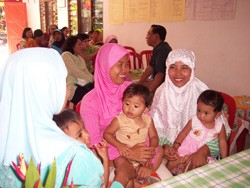
Mothers and pregnant women in Wonokromo, a town in northeastern Java, worried that when time for delivery came, they could not get to the hospital. They also worried there was no guaranteed supply of blood in the event of an emergency requiring a transfusion. Now, thanks to a USAID-supported health initiative, Wonokromo mothers can stop worrying.
The program’s goal is to reduce maternal, infant, and child mortality by introducing health practices to poor and vulnerable mothers. The program is run through a partnership between local government, organizations like USAID, and private enterprises. Efforts that make pregnancy safer and improve infant care — such as staff training and monthly midwife visits — have brought positive results to new mothers and newborns. A core team of seven women volunteers meets once a week to share health and childcare information and to identify concerns and problems. As a result, mothers are now guaranteed transport to the hospital when they go into labor, and a dependable blood supply.
Mustandaria, an expectant mother from Wonokromo, said that she appreciates the knowledge she gained about nutrition and childhood diseases. She looks forward to learning more, and feels more confident about her pregnancy.
By teaching the women of Wonokromo about pregnancy and the birthing process, and by ensuring that local hospital are well equipped and their staff well trained, the program has allowed soon-to-be mothers to focus on what matters most: taking care of themselves and their babies.







Comment
Make a general inquiry or suggest an improvement.